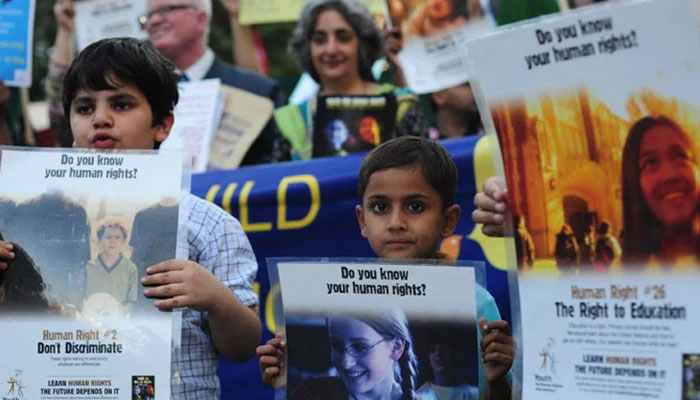Human rights laws without budget and resources cannot be implemented
Will adequate budgetary resources be released for the effective implementation of the human rights laws?
April 23, 2022

Throughout Pakistan’s turbulent political history, no prime minister has been able to perform his/her duties for a full term. The recurring political crises within Pakistan withhold the state from initiating a provincial and federal concerted effort towards eliminating human rights violations.
History suggests that members of the government and even the opposition remain occupied in short-sighted politics for political gains as opposed to effectively working towards breaking systematic and structural barriers to the implementation of human rights legislation.
With each incoming government, Pakistan witnesses the passage of several human rights legislations. Several federal legislations on women and children’s rights were enacted under the government led by the former prime minister of Pakistan, Imran Khan.
These legislations require extensive systematic changes in the criminal justice system (CJS) and massive budgetary allocations to be effectively implemented. These include: the Zainab Alert Response and Recovery Act 2018 (‘Zainab Act’), the Legal Aid and Justice Authority Act 2020 (‘Legal Aid Act’) and the Anti-Rape (Investigation and Trial) Act 2021 (‘Anti-Rape Act’).
The Zainab Act is named after a seven-year-old girl who was kidnapped, raped and brutally killed in January 2018 in district Kasur. Zainab’s case led to massive public outcry and protests across Pakistan on the inefficiency of the police and gaps in the protection of missing children in the CJS. The Zainab Alert, Response and Recovery Agency (ZARRA), mandated under Section 3 of the Zainab Act, was launched by the Ministry of Human Rights on October 15, 2020.
However, the powers and functions of ZARRA, as laid down under Section 5 of the Act, are yet to be effectively implemented; nor has coordination between ZARRA and local police stations been effectively achieved.
Many police officers remain unaware of the Zainab Act. Moreover, the wide range of parallel systems and duplication of mechanisms through various legislations has created confusion within the various CJS actors on the right course of action.
ZARRA’s financing is to come from funds allocated by the federal government. However, the budgetary allocations required for the effective implementation of the Zainab Act have not been outlined. It remains to be seen whether this inspirational Act will ever achieve its effective implementation.
The Legal Aid Act was enacted in order to establish a Legal Aid and Justice Authority to provide legal and financial assistance for access to justice to the poor and vulnerable segments of society in criminal cases. It was passed by parliament on March 24, 2020.
Former minister for human rights Shireen Mazari informed the Senate during Question Hour in February 2022 that legal aid was being provided through pro-bono lawyers after the establishment of the Legal Aid and Justice Authority.
Nevertheless, the powers and functions of the authority provided under Section 8 have not been effectively implemented. In order to implement the Act, reliance is made upon a fund (which also includes grants from the federal, provincial and local government). For how long will a system of pro-bono lawyers work and what will be the quality of the lawyers providing legal aid? These important questions remain unanswered.
The Anti-Rape Act was originally promulgated as an ordinance titled as ‘The Anti-Rape (Investigation and Trial) Ordinance 2020’ on December 15, 2020. It was promulgated in response to the public outcry and protests urging the government to eliminate sexual violence against women and girls and secure their human rights, after the horrifying Lahore motorway rape case that had terrorized the entire nation. The Anti-Rape Ordinance was renewed and then later passed as an act of parliament in 2021.
The aim of the Anti-Rape Act is to ensure the expeditious redressal of sexual violence crimes through special investigation teams and special courts providing for efficacious procedures, speedy trial and evidence. The Anti Rape Act contains several special provisions and applies specifically to women and children.
These include the establishment of special courts (Section 3), anti-rape crisis cells (Section 4), legal assistance for victims/survivors (Section 6), special prosecutors (Section 7), victim and witness protection mechanisms (Section 8), special sexual offences investigation units (Section 9), independent support advisers (Section 11), in-camera trial (Section 12) and register of sex offenders (Section 24).
Moreover, Section 20 of the Anti-Rape Act states that the prime minister shall establish a fund to carry out the purposes of the Act. As per Section 20 (3)(a), the sources of the fund also include grants from the federal government and provincial governments.
While the special prosecutors and special sexual offences investigation units (SSIOU) have already been notified by some provinces, they have not yet been trained on the new definition of rape, introduced through an amendment to the Pakistan penal code. Moreover, none of the provinces has established the anti-rape crises cells.
Once again, a duplication of the laws is being seen. A register of sex offenders has not been established either. The rules regarding the management of the Fund have not been made public yet. Without extensive budgetary resources, it is impossible to implement the Anti-Rape Act.
The important question is: will the protection mechanisms specified under the Anti-Rape Act be established when there is so much political instability and clashes between federal and provincial governments?
Despite the enactment of various inspirational and robust laws on women and children’s human rights, Pakistan consecutively ranks as one of the most dangerous countries in the world for women. The looming political instability only adds fuel to the existing fire. The fate of the aforementioned legislation hangs in the balance. The crucial question which arises is: will adequate budgetary resources be released for their effective implementation, or will they be brushed aside by the newly formed government? Only time will tell.
The writer is a barrister. She tweets @RidaT95 and can be reached at: [email protected]
Originally published in The News











